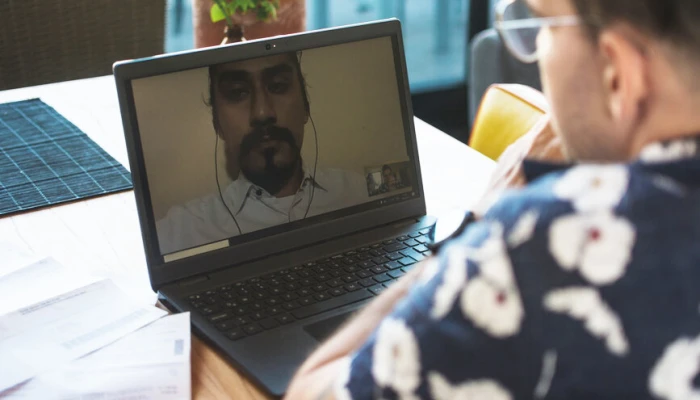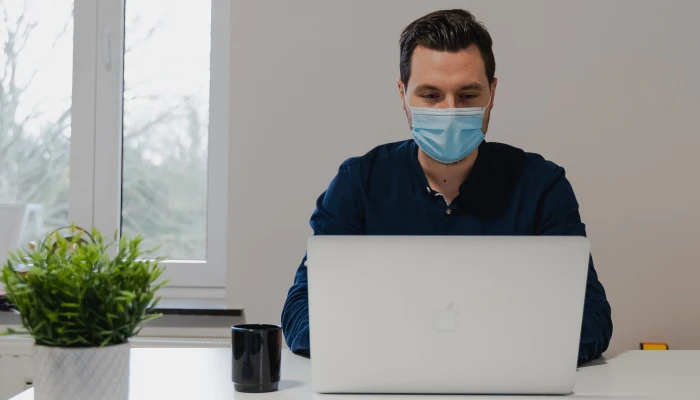R U OK at work: handling the conversation when someone may be suicidal
In this 3-part interview series, I speak to En Masse Head of Psychology Dr Andrew Stock about the various types of recommended interventions at work in relation to supporting a team member with a mental health issue, with special consideration of some of the current challenges of the pandemic and working from home.
Second in the series is our 12-minute chat on how to navigate the conversation with someone who may be having suicidal thoughts, including some of the warning signs that will help you know when certain questions are appropriate to ask.
A transcript is available further below.
This recording contains subject matter, including references to specific examples of behaviour, to which you might relate, or that may trigger distress or discomfort.
If you do experience this normal reaction, we encourage you to speak to:
- your Employee Assistance Program, if one's available at your workplace
- Lifeline (in Australia) on 13 11 14
- Suicide Call Back Service (in Australia) on 1300 659 467
- in less urgent situations, your GP or other qualified health professional.
In situations where you or someone you know is in imminent danger, contact:
- emergency services (in Australia) on 000 (triple zero).
“It’s not that we all have to be amazing at assessing all these levels of risk, but we do have to know our people, we do have to have our ears to the ground and we do have to be willing to have these conversations, knowing that one of the best things we can do for a person who is experiencing [suicidal] ideation is just allowing them a space to feel safe enough to talk about that.”
— Dr Andrew Stock
Transcript
HK: Hello and welcome to this podcast. This is the second of a three part series and I’m Helena Kuo, I’m the Managing Director for En Masse. I’m delighted again as always to be here with our Head of Psychology Dr Andrew Stock, and today I’m going to be talking with Andrew about when you might be worried that someone is thinking of actually taking their own life. Hello and welcome Andrew.
AS: Hi Helena. It’s good to be here and it’s an important and somewhat of a tricky topic that we’re talking about today so we’re going to do the best we can to talk about it and also see how we can help others do the same.
HK: Absolutely, thank you. So let’s talk about some of the warning signs. If you are worried that someone is thinking of taking their own life, what might be some of the things that you might notice about them?
AS: I think I mentioned in our previous podcast Helena that we’re looking for significant changes in behaviour; things that we’re not used to seeing. You made the very important point of knowing people and what they’re typically like, so that’s the number one thing.
Now under that very broad umbrella, obviously we want to be noticing things that are more closely associated with people really getting to a place where they sense that things are hopeless and helpless and aren’t going to change. I would say one of the single most significant factors involved there is when people really feel as though they’re disconnected and unsupported, and isn’t that a particularly poignant challenge right now? Not only in many parts of Australia but also across the globe when there are important public health measures put in place, restrictions, even lockdowns, where people might start to feel really isolated.
It was just the other day that I read a quote by a person who was dealing with some really difficult times in their life, and they said they felt like even when they were surrounded by people that they felt completely disconnected and alone. So it’s not only trying to objectively measure how well someone is connected it’s also being able to have that discussion and understand whether or not they’re experiencing a lack of social support, a lack of connection with the people that they care about.
Often in my practice, if I am trying to work with someone who’s having a really difficult time and they’re even thinking about or having thoughts about ending their life by suicide, it’s often to do with a recent event, maybe a breakdown in a relationship, maybe something really difficult that’s happened within their family, something like that. So it’s important for us to know what’s going on in the lives of the people we’re around as well because sometimes it can be nothing to do specifically with them, if you know what I mean, and more what’s happened to them recently, and then just feeling as though they’re not sure if they can go on in light of a loss or a trauma perhaps.
HK: Thank you, that’s a really interesting point. So we’re talking about knowing someone’s ‘normal’, and we have conversations at work with our colleagues about work, but that’s just really highlighted the importance of having conversations with people about things other than work, so that if there is an event that you might be more aware of, that might be one thing that would be an early warning sign. So that’s probably one of the risk factors that a recent event or an event has actually triggered this. People might think about ending their life by suicide and we hear a lot about ‘suicidal ideation’. So when people think about suicide, is there usually an intention to act on those thoughts?
AS: Well, the short answer is no. The slightly longer answer is that obviously one of the more significant risk factors for suicide behaviour, an attempt to actually end your life by suicide, is of course first thinking about and contemplating suicide. So we want people to feel as though it’s actually okay to share if that’s what they’re thinking or feeling. It’s one of the reasons it’s so important that we that we’ve reduced the stigma around suicide. It’s not as uncommon as many people think to have thoughts somewhere along that continuum. When we think about either thinking “I just don’t want to be here anymore” which is something you might hear from a colleague just feeling fed up, just feeling like “I don’t know what the point of anything is anymore” all the way to more active thoughts of “I want to end my life and this is how I’m going to do it”.
So it’s not that we all have to be amazing at assessing all these levels of risk, but we do have to know our people, we do have to have our ears to the ground and we do have to be willing to have these conversations, knowing that one of the best things we can do for a person who is experiencing ideation is just allowing them a space to feel safe enough to talk about that, because that lessens the risk of the very rare occurrence, yet still far too regular occurrence, if we think about it overall, of people who actually then might try to end their life by suicide. It’s rare, and so it means that you don’t have to immediately go to the battle stations if someone mentions something that worries you, but it means that let’s jump up, let’s be proactive here, let’s get the person the support they need while also not trying to make them feel as though all of a sudden the spotlight’s on them and they’re being pathologised in any significant way.
HK: Well that’s actually quite reassuring to hear that, that people may have ideation around suicide but not an intention to act which is actually very, very reassuring to hear, because I think there is a lot of people who think that “oh well, if I open up the subject I’m actually going to increase the risk and so I don’t want to do that, so I’m not even going to open up the subject, I’m not even going to have that conversation with that person.” And it’s awkward and it is uncomfortable and we tend to steer away from things that are a bit awkward and uncomfortable don’t we? So let’s jump into what do you say to someone if you are really concerned when you’re having a conversation with them or you’ve had a number of conversations with them and you really are concerned that “oh I think they might be thinking of ending their life”. But what can you say?
AS: Quite frankly, you can and it’s best to ask them.
HK: Be direct.
AS: Yes. “Have you thought about ending your life? Have you thought about suicide?” People think “Oh no, I can’t ask that – that’s too much.” But it’s not – if they haven’t they’ll tell you: “No I haven’t.” If they have then they may or may not tell you, but at least they know again that you care, that you’re noticing and at that point you can also normalise. Whether or not they tell you that they’ve had ideation, you can say: “Hey I’m here for you and I care about you and it doesn’t mean there’s anything wrong with you, it just means that if you are experiencing that – that you’re struggling, and we all struggle at times – it’s about getting support.”
HK: Yes and really important to say that you’re there and there for support for them, and I really liked what you said previously about if somebody does say “well yes I am thinking of suicide” that it’s not all guns blazing – let’s ring everyone that we can to get support that we need. What might be the next step if somebody does say “well yes I am thinking about it” – what might be just the next immediate step for people?
AS: Well, it would be to ask that person, or if they don’t volunteer the information, that they not only have been thinking about it but they have the intent to do it, and if that’s the case then obviously we’ve reached the end of our having a conversation perhaps and it’s more about “okay right now what we need to do is we need to make sure that you’re safe” and that’s where we do have very wonderful and helpful resources here in Australia, numbers we can call.
We can even engage emergency services. I know here in Western Australia we have sections of emergency services who are specifically trained to be able to talk to people in these situations which I think is just a wonderful resource to have, and so at that point it becomes – and this is the same for me in my role as a psychologist – it becomes less about trying to understand or talk through things and more about “okay right now we just need to make sure that you’re safe” and then contacting the relevant people to help us to ensure that.
You might notice I’m trying to be quite collaborative about it. I’m not saying: “Hey I’m calling the cops – you need to be sorted out here.” I’m saying: “Hey let’s get you safe. Let’s figure out what’s gonna work for you right now.”
HK: Really practical advice. I really like that “let’s get you safe, let’s figure out what’s going to be right for you now”. And so there is a lot of different options there, there’s triple zero, there’s Lifeline, there’s Suicide Call Back Service, so there is a lot of resources available to people.
Thank you very much, Andrew. It’s a tough topic to talk about but a really important one as you said at the beginning, and just some really practical things that we can say and do if we are really concerned about someone. So thank you again for those great tips and I look forward to our third podcast and talking more a little bit about suicide and grief.
AS: Excellent, it’s good to be here and talking about it is what destigmatises it, so I appreciate the opportunity and I really appreciate everyone tuning in and having a listen as well.
HK: Wonderful, thanks very much Andrew and we’ll be back again soon everyone.


